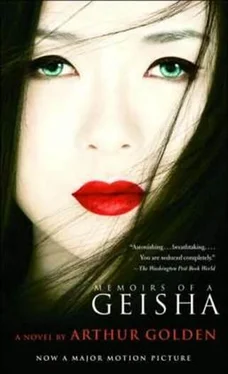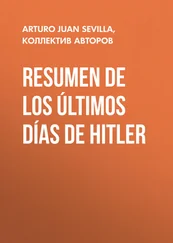I heard nothing more of what she said because of the terrible screams from farther up the walkway. Granny was giving Pumpkin a beating for not having kept a better eye on me.
* * *
As it turned out, I’d broken my arm landing as I had in that courtyard. The next morning a doctor came and took me to a clinic nearby. It was late afternoon already by the time I was brought back to the okiya with a plaster cast on my arm. I was still in terrible pain, but Mother called me immediately to her room. For a long while she sat staring at me, patting Taku with one hand and holding her pipe in her mouth with the other.
“Do you know how much I paid for you?” she said to me at last.
“No, ma’am,” I answered. “But you’re going to tell me you paid more than I’m worth.”
I won’t say this was a polite way to respond. In fact, I thought Mother might slap me for it, but I was beyond caring. It seemed to me nothing in the world would ever be right again. Mother clenched her teeth together and gave a few coughs in that strange laugh of hers.
“You’re right about that!” she said. “Half a yen might have been more than you’re worth. Well, I had the impression you were clever. But you’re not clever enough to know what’s good for you.”
She went back to puffing at her pipe for a while, and then she said, “I paid seventy-five yen for you, that’s what I paid. Then you went and ruined a kimono, and stole a brooch, and now you’ve broken your arm, so I’ll be adding medical expenses to your debts as well. Plus you have your meals and lessons, and just this morning I heard from the mistress of the Tatsuyo, over in Miyagawa-cho, that your older sister has run away. The mistress there still hasn’t paid me what she owes. Now she tells me she’s not going to do it! I’ll add that to your debt as well, but what difference will it make? You already owe more than you’ll ever repay.”
So Satsu had escaped. I’d spent the day wondering, and now I had my answer. I wanted to feel happy for her, but I couldn’t.
“I suppose you could repay it after ten or fifteen years as a geisha,” she went on, “if you happened to be a success. But who would invest another sen in a girl who runs away?”
I wasn’t sure how to reply to any of this, so I told Mother I was sorry. She’d been talking to me pleasantly enough until then, but after my apology, she put her pipe on the table and stuck out her jaw so much-from anger, I suppose-that she gave me the impression of an animal about to strike.
“Sorry, are you? I was a fool to invest so much money in you in the first place. You’re probably the most expensive maid in all of Gion! If I could sell off your bones to pay back some of your debts, why, I’d rip them right out of your body!”
With this, she ordered me out of the room and put her pipe back into her mouth.
My lip was trembling when I left, but I held my feelings in; for there on the landing stood Hatsumomo. Mr. Bekku was waiting to finish tying her obi while Auntie, with a handkerchief in her hand, stood in front of Hatsumomo, peering into her eyes.
“Well, it’s all smeared,” Auntie said. “There’s nothing more I can do. You’ll have to finish your little cry and redo your makeup afterward.”
I knew exactly why Hatsumomo was crying. Her boyfriend had stopped seeing her, now that she’d been barred from bringing him to the okiya. I’d learned this the morning before and felt certain Hatsumomo was going to blame her troubles on me. I was eager to get down the stairs before she spotted me, but it was already too late. She snatched the handkerchief from Auntie’s hand and made a gesture calling me over. I certainly didn’t want to go, but I couldn’t refuse.
“You’ve got no business with Chiyo,” Auntie said to her. “Just go into your room and finish your makeup.”
Hatsumomo didn’t reply, but drew me into her room and shut the door behind us.
“I’ve spent days trying to decide exactly how I ought to ruin your life,” she said to me. “But now you’ve tried to run away, and done it for me! I don’t know whether to feel pleased. I was looking forward to doing it myself.”
It was very rude of me, but I bowed to Hatsumomo and slid open the door to let myself out without replying. She might have struck me for it, but she only followed me into the hall and said, “If you wonder what it will be like as a maid all your life, just have a talk with Auntie! Already you’re like two ends of the same piece of string. She has her broken hip; you have your broken arm. Perhaps one day you’ll even look like a man, just the way Auntie does!”
“There you go, Hatsumomo,” Auntie said. “Show us that famous charm of yours.”
* * *
Back when I was a little girl of five or six, and had never so much as thought about Kyoto once in all my life, I knew a little boy named Noboru in our village. I’m sure he was a nice boy, but he had a very unpleasant smell, and I think that’s why he was so unpopular. Whenever he spoke, all the other children paid him no more attention than if a bird had chirped or a frog had croaked, and poor Noboru often sat right down on the ground and cried. In the months after my failed escape, I came to understand just what life must have been like for him; because no one spoke to me at all unless it was to give me an order. Mother had always treated me as though I were only a puff of smoke, for she had more important things on her mind. But now all the maids, and the cook, and Granny did the same.
All that bitter cold winter, I wondered what had become of Satsu, and of my mother and father. Most nights when I lay on my futon I was sick with anxiety, and felt a pit inside myself as big and empty as if the whole world were nothing more than a giant hall empty of people. To comfort myself I closed my eyes and imagined that I was walking along the path beside the sea cliffs in Yoroido. I knew it so well I could picture myself there as vividly as if I really had run away with Satsu and was back at home again. In my mind I rushed toward our tipsy house holding Satsu’s hand-though I had never held her hand before-knowing that in another few moments we would be reunited with our mother and father. I never did manage to reach the house in these fantasies; perhaps I was too afraid of what I might find there, and in any case, it was the trip along the path that seemed to comfort me. Then at some point I would hear the cough of one of the maids near me, or the embarrassing sound of Granny passing wind with a groan, and in that instant the smell of the sea air dissolved, the coarse dirt of the path beneath my feet turned into the sheets of my futon once again, and I was left where I’d started with nothing but my own loneliness.
* * *
When spring came, the cherry trees blossomed in Maruyama Park, and no one in Kyoto seemed to talk about anything else. Hatsumomo was busier than usual during the daytime because of all the blossom-viewing parties. I envied her the bustling life I saw her prepare for every afternoon. I’d already begun to give up my hopes of awakening one night to find that Satsu had sneaked into our okiya to rescue me, or that in some other way I might hear word of my family in Yoroido. Then one morning as Mother and Auntie were preparing to take Granny on a picnic, I came down the stairs to find a package on the floor of the front entrance hall. It was a box about as long as my arm, wrapped in heavy paper and tied up with frayed twine. I knew it was none of my business; but since no one was around to see me, I went over to read the name and address in heavy characters on the face. It said:
Sakamoto Chiyo
c/o Nitta Kayoko
Gion Tominaga-cho
City of Kyoto, Kyoto Prefecture
Читать дальше












